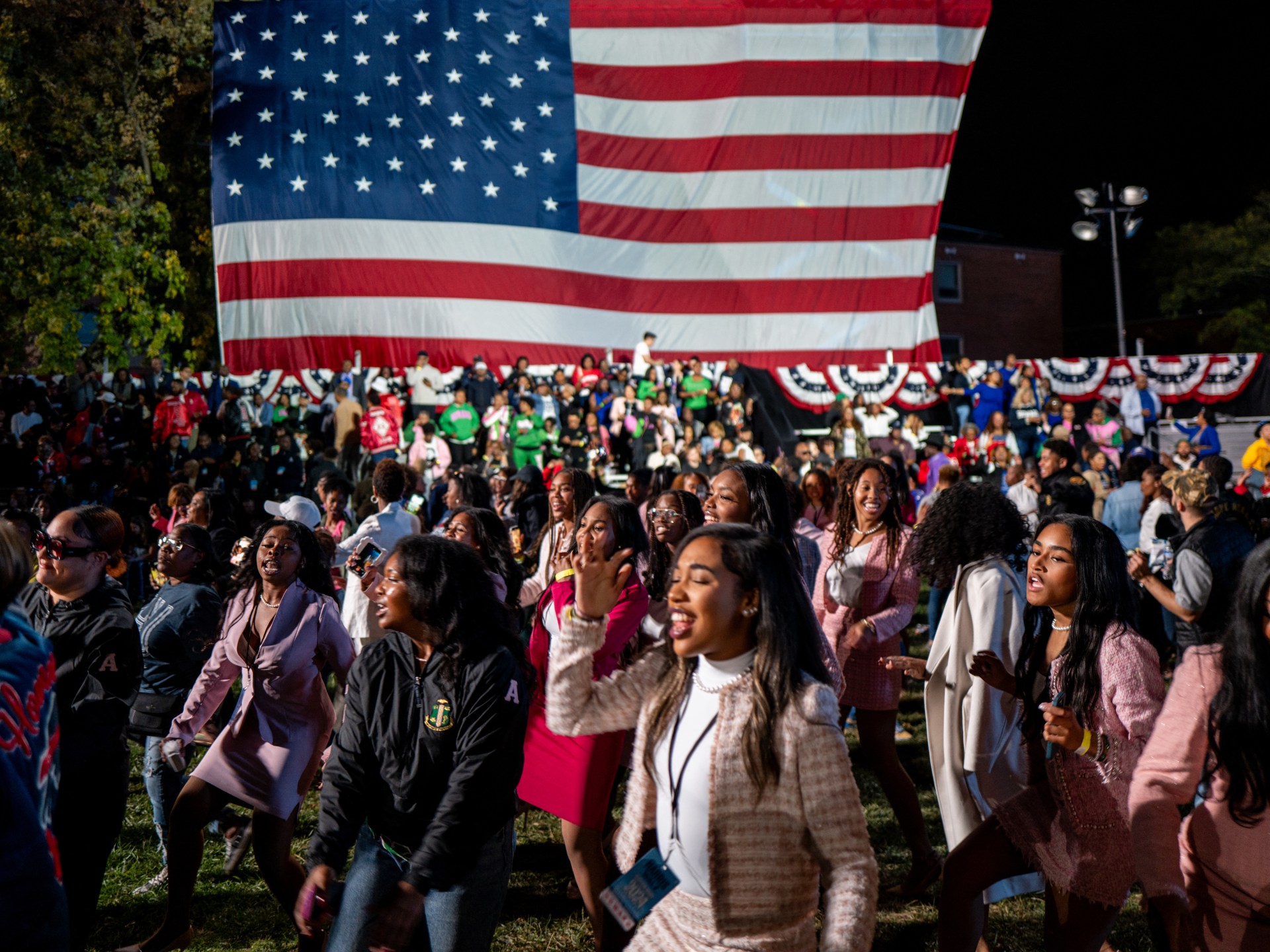Why Trump’s win has sparked a ‘4B feminist movement’ with roots in S Korea
 09 November 2024
09 November 2024


A feminist movement sweeping South Korea, in which women are saying “No” to any form of intimate relationships with men, is taking hold in the United States following former President Donald Trump’s resounding victory in the presidential election.
So what is the 4B movement and why are American women turning to it now?
What is the 4B movement?
The 4B movement originally emerged from the fringes of the South Korean feminist movement.
It developed in South Korean feminist circles and on social media in the mid-to-late 2010s during a wave of violence against women in the country, and in protest over other manifestations of sexism and inequality in South Korean society.
4B is shorthand for four words that start with “bi”, which means “no” in Korean.
The movement calls for:
Bihon, which means no heterosexual marriage.
Bichulsan, no childbirth.
Biyeonae, no dating.
Bisekseu, no heterosexual sexual relationships.
Why did this movement emerge in South Korea?
Women are fed up with the scale of male violence in South Korean society.
A report published in 2018 showed that in the previous nine years, at least 824 women in South Korea had been killed and a further 602 were put at risk of death by violence at the hands of their intimate partners.
But there are also economic factors.
According to data from the Organisation for Economic Co-operation and Development (OECD), South Korean men earn 31.2 percent more, on average, than women.
South Korean society also tends to be fairly conservative when it comes to families.
Ayo Wahlberg, a professor in the anthropology department at the University of Copenhagen, told Al Jazeera that the responsibility for the bulk of childcare and household chores, as well as taking care of the elderly, generally falls on the shoulders of women. But, with rising inflation, women also have little choice but to work outside of the home, meaning their responsibilities are doubled.
This has led to more women forgoing the prospect of having children while also making less money than their male spouses – a situation many say they find disheartening.
Meanwhile, the birthrate in South Korea continues to drop rapidly. In recent years, the country has had one of the lowest birthrates in the world. In February this year, Statistics Korea published data showing that the overall birthrate had dropped by 8 percent in 2023 to 0.72 children per woman in their lifetime compared with 0.78 in 2022. The low birthrate has been declared a national emergency.
‘Your body, my choice’: Why is the movement gathering interest in the US now?
Soon after it had become apparent that Trump had won the US presidential election this week, young women in the US took to social media platforms such as TikTok and X, encouraging other women to take inspiration from the 4B movement.
While CNN’s exit poll suggested that Trump won 46 percent of the women’s vote and Harris won 54 percent, it also showed that Harris had won just 43.5 percent of the male vote compared with Trump’s 56.5 percent.
Young women on social media said they were disappointed that young men had voted for a candidate who they say does not respect their bodily autonomy.
To make matters worse, some Trump supporters, such as far-right political activist Nick Fuentes, started posting misogynistic messages on X such as the statement, “Your body, my choice.”
@_jessie_fitz You make us do, too much labour! #fyp #foryoupageofficiall #kamalaharris2024🇺🇸💙 #werenotgoingback #labour #womensupportingwomen #womensempowerment #4bmovement #fthepatriarchy #patriarchy #mysogyny ♬ labour – Paris Paloma
The message is a co-optation of “my body, my choice” a slogan used historically by feminists rallying for autonomy and reproductive rights.
The right to abortion was a major talking point in the lead-up to the election.
While the Democratic candidate, Kamala Harris, was banking on abortion being a big issue, it turned out to be much less of a decisive issue for voters than economic issues such as inflation, unemployment and the cost of living.
The election was the first presidential vote since the landmark 1973 Roe v Wade court ruling was overturned by the Supreme Court in 2022, ending women’s federal right to an abortion in the US. The decision on laws regarding abortion was reverted to individual states instead.
Trump claimed credit for the overturning of Roe v Wade, which was made possible by his appointments of three conservative judges to the top court.
Democrats campaigned in the belief that this would bring women out to vote for Harris. That position did not pay off entirely, however.
On Tuesday this week, as the election was in full swing, 10 states also voted on whether or not to enshrine the right to abortion in their constitutions. Of these, seven states passed the measures and three states did not.
What could happen to abortion once Trump is in power?
Trump has said that he would veto a federal abortion bill, preferring to leave the question of laws regarding the right to abortion down to individual states to decide.
However, fears now loom among women’s rights groups that he will be pressured by Republicans, who now control the Senate and the Supreme Court – and are close to controlling the House of Representatives as well – into making a federal abortion ban across the US a reality.
There are also fears that Trump’s administration could have the power to enforce an interpretation of the 1873 Comstock Act, which makes it a federal crime to sell and receive abortion-related medication or other materials. The law has not been enforced for decades.
Many say Trump reveals a great deal about his general view of women through the comments he has made over the years.
Sexual abuse allegations
In May 2023, a US jury found Trump liable for sexually abusing journalist and author E Jean Carroll in the 1990s. Carroll had detailed the abuse in a memoir in 2019, after which Trump branded her a liar and called her story a “con job”. The court also found that he had defamed her and ordered him to pay damages of more than $83m.
In 2018, veteran journalist Bob Woodward wrote in his book, Fear: Trump in the White House, about a conversation between Trump and an unnamed friend of his, acknowledging bad behaviour towards women.
Trump was quoted saying: “You’ve got to deny, deny, deny and push back on these women. If you admit to anything and any culpability, then you’re dead … You’ve got to be strong. You’ve got to be aggressive. You’ve got to push back hard. You’ve got to deny anything that’s said about you. Never admit.”
Disparaging comments about Kamala Harris
Trump has made many controversial remarks about women, including his Democrat challenger and Vice President Kamala Harris.
After Harris inherited the Democrat presidential candidate ticket from Joe Biden earlier this year, Trump told Fox News, “[Harris] somehow – a woman – somehow she’s doing better than [President Joe Biden] did.”
He repeatedly attacked Harris’s intelligence, calling her “stupid” and “dumb” on various occasions.
Other controversial remarks
In June 2004, he said about his daughter, Ivanka Trump, “She does have a very nice figure … if [she] weren’t my daughter, perhaps I’d be dating her.” Ivanka was 23 or 24 at the time.
Earlier, soon after Princess Diana’s death in 1997, Trump told television personality Howard Stern in a radio interview that Diana was “beautiful” but “crazy”.
Stern asked Trump if he could have had a sexual relationship with Diana.
“I think I could have,” Trump replied, the Huffington Post reported.
And according to tapes that The Washington Post said it obtained from 2005, Trump admitted to sexual assault in a conversation with TV host Billy Bush, about women in general: “I’m automatically attracted to beautiful – I just start kissing them. It’s like a magnet. Just kiss. I don’t even wait. And when you’re a star, they let you do it. You can do anything.”
‘Childless cat lady’ comments
His Republican aides, including running mate JD Vance, have also made remarks deemed sexist. In July, comments Vance made about leaders in the Democratic Party in 2021 resurfaced. He said that the leaders of the party did not have children and were “a bunch of childless cat ladies who are miserable at their own lives and the choices that they’ve made and so they want to make the rest of the country miserable, too”.
Related News

Why could a silent asthma epidemic be sweeping Africa?

‘Shame on you’: Protesters interrupt Netanyahu as Gaza truce talks resume

Ukraine fires UK-made Storm Shadow missiles at Russia: What we know

